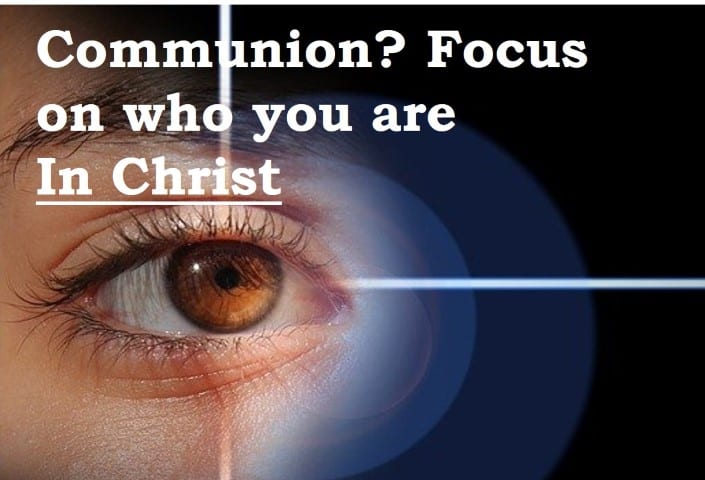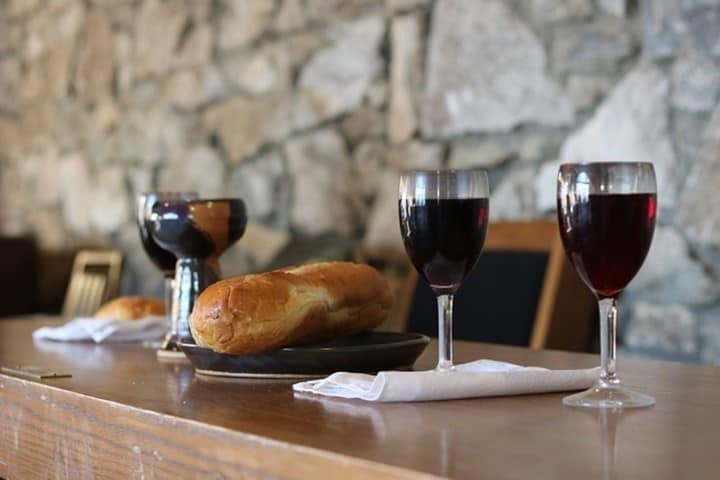What is the Christian communion?
The act of communion (also referred to as The Lords Supper) that the apostle Paul writes about in 1 Corinthians 11:23-34, could be simply summarized as the consumption of bread and wine (representing the body and blood of Christ) by followers of Jesus Christ, as an act of remembrance and/or association (communion) with Him.
“For as often as you eat this bread and drink the cup, you proclaim the Lord’s death until he comes.” ( V26 NASB)
Of course, as you may suspect, it goes much deeper than this!
What we know of as communion is in fact the New Testament version of the Jewish Passover, when the angel of death ‘passed over’ the Jewish homes that had the blood of the sacrificial lamb on the door lintols.
The blood of the lamb saved them from death. (Exodus ch 12)
Jesus is the Christians ‘sacrificial lamb’ and by partaking of the bread and wine (or juice) we are partaking of his body and blood of the lamb and thereby saved from death (cf. 1 Cor 15:55).
“27 And when He had taken a cup and given thanks, He gave it to them, saying, “Drink from it, all of you; 28 for this is My blood of the covenant, which is being poured out for many for forgiveness of sins.” (Matthew 26:27-28)

The Apostle Paul rebukes the Corinthian church
When Paul writes to the Corinthian church, he does so because he has had alarming reports of their behaviour overall – and is not impressed!
In chapter 11 of this epistle however, he concentrates on their behaviour during communion and is anxious to address this issue.
In verses 20-22 he scolds them for their drunken and glutenous behaviour during the Lords Supper. “What! Do you not have houses in which to eat and drink?” (11:22).
Part of his concern lies in the fact that because they may have partaken of the Lords Supper in an ‘unworthy manner’ they are ‘guilty of the body and blood of the Lord’ – an act of sacrilege?
The consequences of partaking in the Lords Supper in an unworthy manner can result in sickness and even death (v 30).
This is extremely serious, and something that demands closer scrutiny.
What does taking communion in an ‘Unworthy Manner’ mean?
For myself, I believe that Paul is actually confronting 2 different issues with this statement.
The first issue is fairly obvious to the reader, as he covers this in the preceding verses where he scolds them for their glutenous, drunken and unruly behaviour.
Also for discriminating against those who were in a less fortunate position than themselves, resulting in rival divisions and factions.
In modern parlance he might just as well have said “Get your act together you bunch of clowns! Show some respect. This is The Lords supper and not some drunken house party!”
It is obvious from a first reading that the disrespectful nature of their communion practices left much to be desired, and indeed results in Paul rebuking them severely for their behaviour.
The second issue he confronts is that of personal accountability.
“Therefore whoever eats the bread or drinks the cup of the Lord in an unworthy way, shall be guilty of the body and the blood of the Lord. 28 But a person must examine himself, and in so doing he is to eat of the bread and drink of the cup. 29 For the one who eats and drinks, eats and drinks judgment to himself if he does not properly recognize the body.” 1 Cor: 27-29
The phrase ‘examine himself’ is of particular interest with regards to the understanding of the former phrase under scrutiny ‘unworthy way’.
In the original Koine Greek, which was the language of the times, the word ‘examine’ is “dokimazo” Which means to examine with a view to approval or to approve. Bible Greek definitions.
In other words. Before a person partakes of the Lords Supper, they must be Christian and know who they are in Christ according to HIS sacrifice.
Who are they in Christ? According to the Bible they are ‘the righteousness of God in Christ Jesus’ (2 Cor 5:21).
To ‘examine yourself’ as a follower of Jesus is NOT to highlight YOUR faults and failings, but rather to highlight Jesus finished work on the cross and to see yourself as God now sees you – without spot or blemish thanks to Jesus sacrificial shedding of his own blood on your behalf.

I am sadly very much aware that this is contrary to much modern-day teaching surrounding the communion table.
Many, many times before communion I have heard the preacher, or an invited guest do an introduction or prayer immediately before inviting guests to partake of the bread and wine (or juice).
Typically they will begin by emphasizing that we have to examine ourselves for any unconfessed sin or offence that we may have caused to others.
Often the verse from Matthew 5:24 is quoted totally out of context to support this view. “leave your offering there before the altar and go; first be reconciled to your brother, and then come and present your offering.”
In many congregations pressure is brought to bear before partaking of communion, to confess sins and forgive and ask forgiveness for any perceived offence.
Otherwise you may fall under the judgement warned about in verse 29.
Personally however, I believe that this is NOT the case according to a proper reading of the scripture as a whole as well as from the chapter under scrutiny. (1 Corinthians 11:23-24).
To be frank, if we were all having to examine ourselves for any ‘flaws’ and confess every sin before we partook of communion, the bread and wine would be left untouched!
We would in effect be depending on our own righteous deeds (as well as our powers of recollection) to become acceptable before The Lord.
This is not, and cannot be what Paul is talking about here.
The Bible is clear on this issue.
To partake of the communion in an ‘unworthy manner not discerning The Lords body’ is to come before God as someone who is sin conscious, and not understanding or apprehending to themselves the ‘finished work’ of Christ.
Because of this sin consciousness, they feel judged already and so eat and drink judgement upon themselves – God does not judge them, it is in effect self-inflicted.
This is often the position of Law conscious Christians (living in the Old Testament), rather that Grace conscious Christians who live according to Paul’s teachings on Grace and the finished work of Christ under the new covenant of Grace. (cf. the book of Galatians).
In addition, If you are sick and partake of communion without the understanding that Christ died for your diseases “By his stripes we are healed”, then you may indeed succumb to the disease and ‘sleep’ as a consequence of your ignorance!
What happens when you take communion
Taking communion or partaking of the Lords Supper has many benefits for the believer.
These benefits include healing, fellowship with God, positive reflection of your position in Christ and remembrance of HIS sacrifice for us.
As regards the physical elements of the bread and the wine, this is an area that caused even the great Martin Luther and his colleague Huldrych Zwingli to part company.
Luther maintained the doctrine of the Real Presence of Jesus in or under the bread and wine, where they became the physical body and blood of Jesus at the Eucharist.
Zwingli insisted that they were purely symbolic and the act of taking communion was an act of remembrance only. “This cup is the new covenant in My blood; do this, as often as you drink it, in remembrance of Me.” 26 For as often as you eat this bread and drink the cup, you proclaim the Lord’s death until He comes.” 1 Cor:11: 25-26
This argument smolders on today, with the Roman Catholic church for instance believing in transubstantiation – the bread and wine becoming the physical body and blood of Christ upon participation of the Eucharist as administered by the priest.
Most protestant churches take the view of Zwingli that the elements are purely symbolic and communion an act of remembrance and a time for reflection and soul-searching.
Out-of-the-box Bible teachers such as Joseph Prince take the more radical view that the elements themselves become the body and blood of Jesus upon actual consumption – and with a proper understanding of the finished work of Christ, physical healing can be claimed and received “by his wounds we are healed” ( cf. Isaiah 53: 4-5).
Can you partake of communion at home?
Yes indeed! Communion can be taken anywhere and not only in the confines of a church building.
In the early church “Day by day continuing with one mind in the temple, and breaking bread from house to house” (Acts 2:46).
Not only can you take communion at home, but you can take it daily – even several times per day if you so wish.
There is no limit put on the number of times or indeed the places to partake of the lords supper.
Conclusion:
As we can see, it is obvious that this passage in first Corinthians is all about the act of communion and the attitude of the participants.
Particularly with regard to the individuals behavior at ‘the table’.
Whilst I agree with the general idea that you should approach the table with a ‘clean heart’ and confess any apparent sins you may have committed.
I also understand that this is not to put myself right before a Holy God, but rather to put myself in a good place where I can better receive the gift of righteousness that God has already given me through Jesus sacrifice.
If I had to rely on my memory to recall all the sins I had committed, or the unforgiveness in my heart toward an individual, then I would be doomed!
And this is only the sins of commission – what about the sins of omission (cf James 4:17).
It would be impossible and therefore I would never take communion at all in fear that I may take it in an unworthy manner and be judged accordingly.
Perish the thought!
I will partake of the communion with the full understanding that I am celebrating what Christ has done for me (everything) – not what I can do for Him (nothing).
This is how I avoid taking communion in an unworthy manner.
Click here for our complete summary of the 1st and 2nd letters to the Corinthian church

